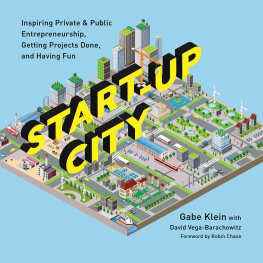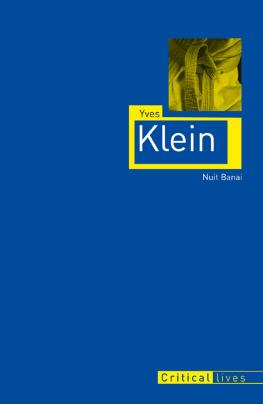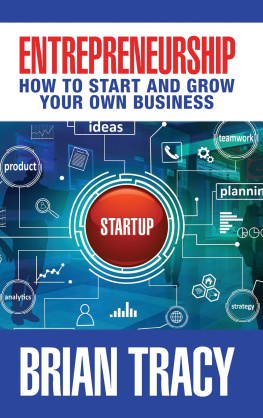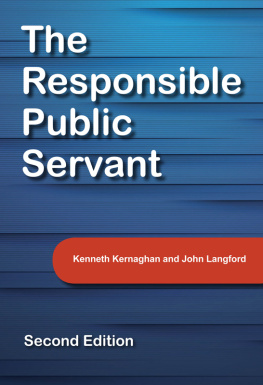
Advance Praise for
START -UP CITY
Cities are leading the change in America. Start-Up City gives a window into how to align all of the stars to make it happen. Gabes playbook provides an inside look at how to integrate private-sector skills and processes while instituting strong, public-oriented management and governance. Start-Up City is a must read for anyone interested in making positive change in our cities.
RAY LAHOOD , former United States Secretary of Transportation
Gabe shows us the art of the possible. This book is not just another lofty call to build more livable cities. It is a practical guide on how to put people first in cities and how to move quickly from idea to execution.
CAROL COLETTA , VP/Community and National Initiatives, The John S. and James L. Knight Foundation
Adaptation, innovation, and a commitment to getting sh*t done fast arent management strategies limited to the private-sector boardroom. Investment in our cities is mission critical for our future, and Start-Up City identifies a new urban entrepreneurialism in the public interest.
JANETTE SADIK-KHAN, Bloomberg Associates; former NYC DOT Commissioner
Gabes lessons in Start-Up City break down the barriers between the public and private sectors in pursuit of a greater city and citizenry. The elusive recipe for successfully innovating within the confines of government is in this book.
ADRIAN FENTY , former Mayor of the District of Columbia
Start-Up City challenges cities to be more nimble and shows them how. Gabe outlines fixes for the disconnect between cities and the private sector. He mixes the simplicity of bike lanes and the wizardry of self-guiding cars with the sharing economy to paint a new picture of mobility. He brings an impish humor to the serious business of change. City-lovers everywhere should read this book.
MARTHA ROSKOWSKI , Vice President of Local Innovation, PeopleForBikes
Finallythe missing manual for the vanguard of can-do change agents who have discovered in their cities a once-in-a-generation opportunity to make a real, lasting impact on American government. What Gabe Klein has learned transforming transportation in D.C. and Chicago will be invaluable as future young leaders take on housing, health care, and other once-intractable urban challenges.
ANTHONY TOWNSEND , author of Smart Cities
It is amazing that D.C. and Chicago gave entrepreneur outsider Gabe Klein the keys to the transportation bus. Now, in Start-Up City, he pulls lessons from the thrilling ride. Kleins disruptive wisdom extracts management, communication, and finance advice from potholes, bike share, and a suite of innovative projects for change-makers inside and outside city hall. Klein muses on a future impacted by cars that drive themselves, but more importantly, advises how to steer that future toward the city we want to live in soon.
RANDY NEUFELD , Director, SRAM Cycling Fund
About Island Press
Since 1984, the nonprofit organization Island Press has been stimulating, shaping, and communicating ideas that are essential for solving environmental problems worldwide. With more than 1,000 titles in print and some 30 new releases each year, we are the nations leading publisher on environmental issues. We identify innovative thinkers and emerging trends in the environmental field. We work with world-renowned experts and authors to develop cross-disciplinary solutions to environmental challenges.
Island Press designs and executes educational campaigns in conjunction with our authors to communicate their critical messages in print, in person, and online using the latest technologies, innovative programs, and the media. Our goal is to reach targeted audiencesscientists, policymakers, environmental advocates, urban planners, the media, and concerned citizenswith information that can be used to create the framework for long-term ecological health and human well-being.
Island Press gratefully acknowledges major support of our work by The Agua Fund, The Andrew W. Mellon Foundation, The Bobolink Foundation, Center for the Living City, The Curtis and Edith Munson Foundation, Forrest C. and Frances H. Lattner Foundation, The JPB Foundation, The Kresge Foundation, The Oram Foundation, Inc., The Overbrook Foundation, The S.D. Bechtel, Jr. Foundation, The Summit Charitable Foundation, Inc., and many other generous supporters.
The opinions expressed in this book are those of the author(s) and do not necessarily reflect the views of our supporters.

Copyright 2015 Gabe Klein
All rights reserved under International and Pan-American Copyright Conventions. No part of this book may be reproduced in any form or by any means without permission in writing from the publisher: Island Press, 2000 M Street., NW, Suite 650, Washington, DC 20036
Island Press is a trademark of The Center for Resource Economics.
This project was made possible with the support of the John S. and James L. Knight Foundation.
Library of Congress Control Number:
2015941185
Printed on recycled, acid-free paper 
Manufactured in the United States of America
10 9 8 7 6 5 4 3 2 1
Keywords: autonomous vehicle, bike lanes, bike share, entrepreneurship, participatory government, public participation, public-private collaboration, public-private partnership, Six Sigma, social marketing, S.M.A.R.T, technological innovation
For Stephanie and Simone


Foreword

W ay back at the end of 2002, I hired Gabe to creatively run our fledgling Zipcar office in Washington, D.C. The car-sharing company was young and lean. Our customers were the center of our universe. We were blazing a new path in a long-established and rigid environment. Everyone perceived the transport sector to consist of large-scale infrastructure projects all requiring years of planning, analysis, and high (and low) financea realm for civil engineers and bureaucrats. Creating desirable, sexy, consumer-facing products was in the jurisdiction of car companies, who themselves were hardly sprightly, requiring five to eight years to bring a vehicle to market. Innovationfast-paced or notwas never something associated with the transport sector. This was new ground that Zipcar was breaking.
Six years later, when Gabe was hired to be D.C.s director of transportation, I was excited for the city, but also skeptical. Gabe would bring to D.C. a focus on meeting residents needs with a wholly open mind, unhindered by whatever wisdom was the status quo in city government. I also wondered how he would ever manage to get anything done in that big soup of rules, regulations, power structures, and plodding workforce that I imagined cities to be. Furthermore, what did Gabe know about working in a big, entrenched bureaucracy?
Next page















